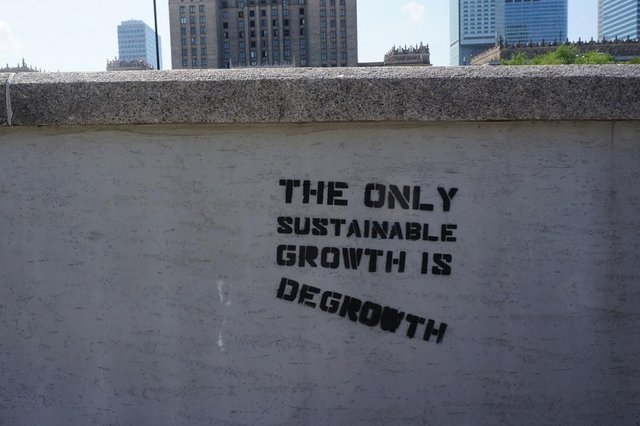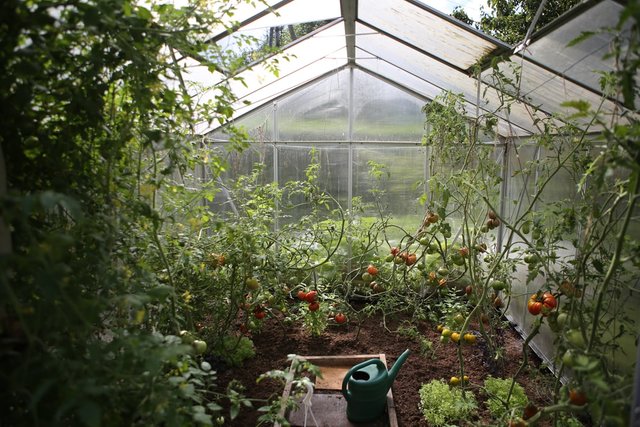The paradox of our time: as long as we collectively opt for more, we all end up with less.


They are all signals. Signals from society that reflect a growing need for deceleration, self-reliance, community spirit, greenery and nature. Yes, you can find it naive, romantic or nostalgic. But is that justified? I don't think we should just laugh this off. This movement is best taken seriously.
In 2019, the French strategic consulting firm Observatoire Société et Consommation conducted a representative survey among two thousand French people in collaboration with an environmental agency and an investment bank. They presented them with three detailed utopian visions of the future, namely:
- a techno-liberal society consisting of strong individualization and leaning on economic growth and technological innovation,
- an ecological society based on less is more, in which living with fewer things and more local consumption is central, and
- a safety society, in which tradition and economic independence play an important role and in which people are protected from external influences.
The answer? The majority (55 percent) prefer the ecological model, with the safety model in second place (29 percent).
The majority of French people are attracted to a lifestyle characterized by proximity, time for their loved ones and consumption of mainly local and organic products.
Time to take matters into your own hands - think of repairing something, gardening or cooking - also scored very high. So people want more autonomy in their lives in a society that instead of always accelerating makes way for time. This desired future unites people who have various wishes in other areas. It offers opportunities for politicians and companies that are open to these new values patterns.


We are at a tipping point
I wonder what the result would be if we extended this type of research to other countries. I have no idea. The 'back to basics' movement could indicate that a similar outcome is possible. In any case, it is clear to me that we are at a tipping point; the relationship between (economic) prosperity and (ecological) well-being will have to be redefined.
Because we can no longer ignore that the adage 'if the economy is doing well, then we're also doing well' is within measurable distance of its end. And our fascination for the infinitely augmentable, for eternal progress, suddenly become painfully tangible. In fact, our one-sided focus on economic growth is increasingly taking on 'uneconomic' forms, because the social and environmental costs (certainly in the long term) are rising faster than the economic benefits (which are also not shared fairly). In most developed economies, GDP has been growing steadily, but welfare indicators have stagnated after the 1970s.
One of the questions that get thrown at you when you question the destructive course of our society based on eternal growth is whether you want to "go back to the Stone Age?" It illustrates the inability to look beyond the current structure of our society and economy. And that is now more necessary than ever. Because if we want to keep our planet livable, we will have to redefine what the basis for human and planetary well-being is, and structure our economy and society accordingly.
There are already several ideas and new (economic) practices in circulation for this. For example, countries such as New Zealand, Scotland and Iceland are already experimenting with the development of a new economic model, in which welfare is central and not consumption and production. More and more cities are opting for replacing or banning outdoor advertising.

São Paulo removed 15,000 billboards, many of which were replaced by street art. Photograph: Adam Hester/Corbis
And so-called 'post-growth policy' is being considered in several places, such as legislation for longer-lasting products, banning planned obsolescence, introducing right to repair, mandatory recyclability, mandatory long-term warranties, etc. These are all attempts to redesign our daily infrastructure so that it meets the needs of our planet and overall human well-being.
Degrowth, economic anthropologist Jason Hickel argues, does not mean that we opt for voluntary impoverishment or misery.
It's not about less for ordinary people, but about improving their lives through a fairer distribution of what we have, so that we no longer have to rob the earth for more. That is the core.
Because that is the paradox of our time: as long as we collectively opt for more, we all end up with less.

References and links:
- Apartheid in the global governance system - Blog Jason Hickel
- Can cities kick ads? Inside the global movement to ban urban billboards - The Guardian
- A post-growth Green New Deal.To decarbonize we must degrow, decommodify, and democratize the economy. - uneavenearth.org
- Philippe Moati : «L’utopie écologique séduit les Français» - Le Monde
hey keysa, dont forget to share your community posts to your blog so everyone can see it.. unless you want it more private..
Great post, much respect, please do post sometime to the ecoTrain community, we support and really like these kind of posts! https://steempeak.com/c/hive-123046/created
I actually didn't know this was possible. I already shared it on my blog. I owe you a big thanks for the tip! Also the first time I used Steempeak, what a user-friendly interface.
Oh, and I will definitely post to the EcoTrain Community in the near future. I really appreciate what you are doing. Have a nice day!